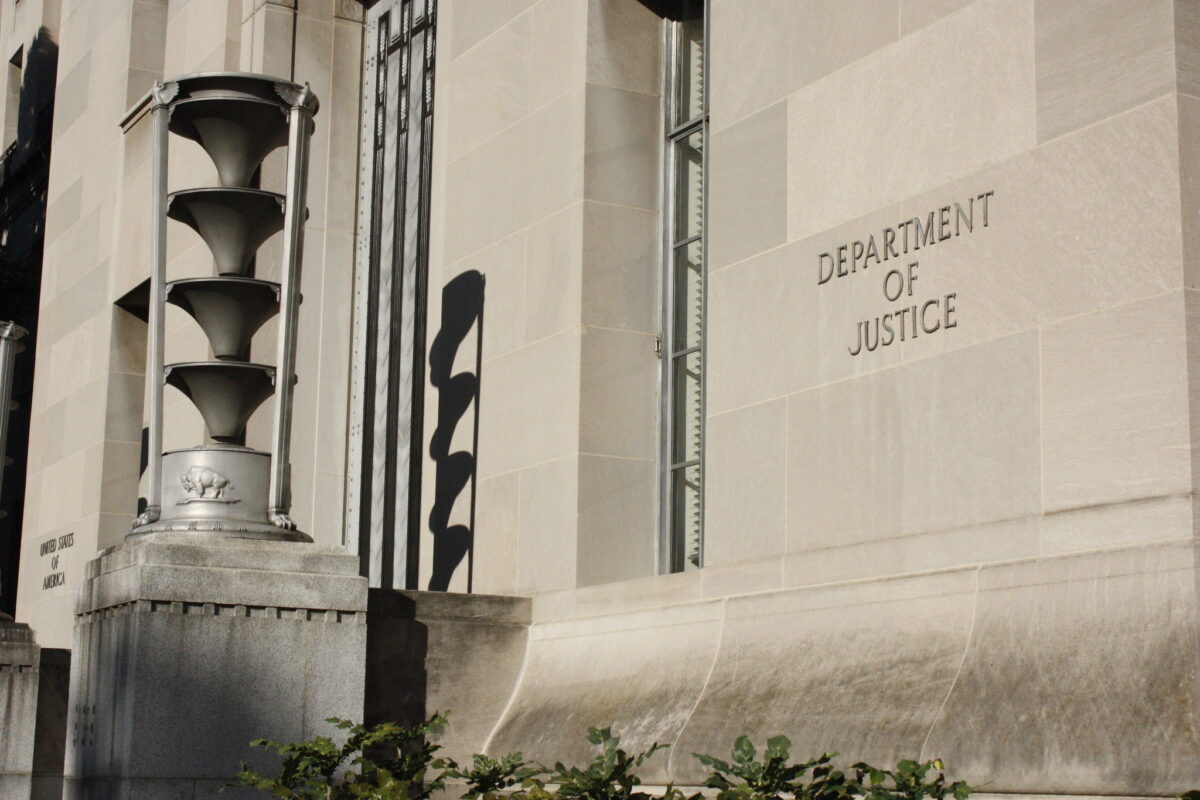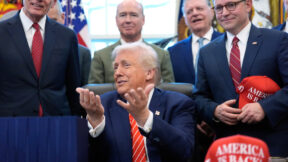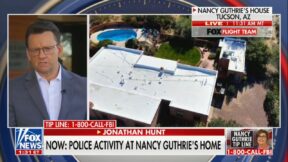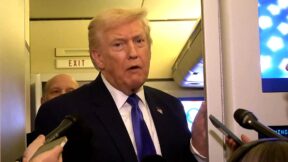Yet Another Top DOJ Prosecutor Resigns After Trump Appointees Demand She Freeze Funds and Investigate Biden EPA Funding

Image by Ryan J. Reilly via Flickr (Creative Commons License).
Another high-ranking prosecutor at the Department of Justice has resigned, this time after she was asked to investigate spending at the Environmental Protection Agency and freeze bank funds for grants issued under President Joe Biden, according to a report by CNN.
The article by Katelyn Polantz, Jamie Gangel, Dana Bash, and Ella Nilsen reports that Denise Cheung, the top criminal prosecutor in the U.S. Attorney’s Office located in Washington D.C., “resigned Tuesday after declining a request from her Trump-appointed superiors to open a grand jury investigation that she viewed as premature, according to multiple people familiar with the matter.”
The two Trump appointees identified by CNN’s reporting are DOJ acting deputy attorney general Emil Bove, who sent the directive asking Cheung to launch the investigation, to Ed Martin, President Donald Trump’s nominee and the current interim acting U.S. Attorney for the District of Columbia.
Bove’s recent order demanding that the criminal case against New York City Mayor Eric Adams be dropped sparked a wave of resignations from DOJ prosecutors. Martin is a longtime GOP operative from Missouri who spent years working on the “Stop the Steal” cause, and has recently been active battling any remaining legal consequences for the Capitol rioters who were pardoned en masse by Trump shortly after he was inaugurated last month. Numerous other federal prosecutors have been fired over the past few weeks.
The instructions sent to Cheung wanted her “to shepherd an investigation into an Environmental Protection Agency funding decision during the Biden administration,” reported CNN, but their sources said that “[s]he refused the order and resigned, in part because she believed there wasn’t sufficient evidence to take that step at the time, as well as seeking to protect lower-level prosecutors from the work.”
Trump and his allies have frequently attacked Biden on issues related to environmental regulations and spending. Lee Zeldin, appointed by Trump to helm the EPA, has been suggesting that the Biden administration improperly rushed funding for grants to eight non-profit environmental organizations, under the auspices of the Inflation Reduction Act. One former EPA official who was part of implementing that funding transfer “told CNN last week it wasn’t rushed or set up nefariously,” the report said.
Cheung, a Harvard Law graduate, has not publicly commented on her resignation or reasons for leaving the DOJ, but did send an office-wide email bidding farewell to her colleagues on Tuesday morning.
“When I started as an AUSA, I took an oath of office to support and defend the Constitution, and I have executed this duty faithfully during my tenure, which has spanned through numerous Administrations,” wrote Cheung. “I know that all of the AUSAs in the office continue to honor their oaths on a daily basis, just as I know that you have always conducted yourself with the utmost integrity.”
Another report from The Washington Post provided additional details on Cheung’s motivations for resigning. According to the article by Carol D. Leonnig and Spencer S. Hsu, Cheung was not just asked to open an investigation she did not believe was warranted, but was also asked to freeze the billions of dollars that were distributed under that Biden environmental grant program.
The Post obtained a copy of Cheung’s resignation letter, addressed to Martin, and published the text. In the letter, Cheung writes that her resignation is being tendered at Martin’s request, following a dispute they had over his demands that she send a “freeze letter” to the bank that held the grant funds despite the “current lack of evidence of any apparent crime and the need to send out any such freeze letter.”
According to Cheung, Martin was unhappy with the letter she had sent because it did not expressly state that the freeze was being requested “pursuant to a criminal investigation” being conducted by the U.S. Attorney’s Office for D.C., and she argued that “the quantum of evidence did not support that action.”
“As I shared with you, at this juncture, based upon the evidence I have reviewed, I still do not believe that there is sufficient evidence to issue the letter you described,” wrote Cheung, “including sufficient evidence to tell the bank that there is probable cause to seize the particular accounts identified. Because I believed that I lacked the legal authority to issue such a letter, I told you that I would not do so. You then asked for my resignation.”
She concluded the letter by writing, “I remain committed to the oath that I took, and it has been an honor of a lifetime to be an AUSA in this Office. I know that all of the AUSAs in the Office will continue to uphold that pledge they have taken, following the facts and the law and complying with their moral, ethical, and legal obligations.”
The full text of Cheung’s resignation letter, according to the Post:
Re: Resignation
Dear United States Attorney Martin:
As you requested, I am tendering my resignation from this Office.
I have been proud to serve at the U.S. Department of Justice and this Office for over 24 years. During my tenure, which has spanned over many different Administrations, I have always been guided by the oath that I took upon being sworn as an AUSA to support and defend the Constitution. Whether it was prosecuting homicide cases in the Superior Court Division or investigating international terrorism cases in the Criminal Division, I have always worked to enforce the rule of law, to vindicate the rights of victims, and to protect the security of the nation. I believe that the values the Department of Justice stands for, and the many people that work every day to fulfill them, are to be promoted and cherished.
As a member of the management team in the Office, including as Chief of the Criminal Division, I have always sought to offer sound and ethical counsel to my principals and to execute their directives to the best of my ability.
Earlier yesterday. I was asked to review documentation supplied by the Office of the Deputy Attorney General (ODAG) to open a criminal investigation into whether a contract had been unlawfully awarded by an executive agency before the change in Administration and to issue grand jury subpoenas pursuant to this investigation. I was told that there was time sensitivity and action had to be taken that day because there was concern that contract awardees could continue to draw down on accounts handled by the bank handling the disbursements. I conferred with others in the Office, all of whom have substantial white collar criminal prosecution experience, and reviewed documentation provided by ODAG, in determining whether the predicate for opening such a grand jury investigation existed. Despite assessing that the existing documents on their face did not seem to meet this threshold, an ODAG representative stated that he believed sufficient predication existed, including in the form of a video where statements were made by a former political appointee of the executive agency in question.
At one point, it was conveyed that the ODAG representative would work directly with a line AUSA from the Office in handling the matter and bypass any USAO-DC supervisory chain. Upon further conversations with the Principal Assistant U.S. Attorney (PAUSA), and in a subsequent conversation with the ODAG representative, I received clarification that a type of “freeze letter” requesting that the bank freeze assets would be adequate at this point, as opposed to other legal process. I took point on this process.
Upon further discussion with the PAUSA, and upon an understanding that ODAG agreed that such a reach-out was appropriate in light of the lack of any known investigative agency working on the matter, I contacted a supervisor at the Washington Field Office (WFO) of the FBI and provided him with the materials received from ODAG and also referenced the possible existence of the video and statements made by the head of the executive agency. I further conveyed ODAG’s desire to send out the freeze letter to the bank as soon as possible as to avoid subsequent payouts. The FBI-WFO supervisor forwarded links of these statements and the video, which I also reviewed. Despite the federal holiday yesterday, the FBI-WFO supervisor, as well as other FBI-WFO managers, spoke frequently throughout the day yesterday with me to discuss the matter, including what, if any, possible criminal charges might be applicable, as well as the sufficiency of the evidence of any criminal offense or the connection of any alleged crime to the accounts at issue.
During this period, I sent a draft freeze letter provided by the FBI-WFO supervisor to the PAUSA at 4:31 p.m. In an email sent at 4:46 p.m., the PAUSA conveyed suggested language “in case it [was] helpful” from the ODAG representative, which included language represented to be from the Second Circuit, including the phrase “the government has probable cause to believe that the funds on deposit in the above-referenced account(s) at [named bank] are subject to seizure and forfeiture to the United States based upon violations…” I subsequently informed the PAUSA that the suggested language was not appropriate to the matter at hand.Despite expressing some concern about the current lack of evidence of any apparent crime and the need to send out any such freeze letter, FBI-WFO personnel were able to consult with necessary individuals, including legal counsel, at their office. I was told that if FBI-WFO was unwilling to send out such a freeze letter, that you would direct someone from USAO-DC to send out such a correspondence to the bank. However, that contingency did not come to pass, as FBI-WFO determined that they were willing to send out the freeze letter, but asked that I first send them an email stating that, based on the evidence, there was possible evidence of certain criminal violations. I emailed them the following statement: “Based upon the information we received from ODAG and public-source materials, including a video of statements by a former [executive agency] official, USAO-DC believes that there may be conduct that constitutes potential violations of 18 U.S.C. Sec. 371 (conspiracy to defraud the United States) and 18 U.S.C. Sec. 1343 (wire fraud) that merits additional investigation.”
After they received this email, FBI-WFO subsequently issued a letter to the bank recommending a thirty-day administrative freeze on certain assets. After this letter was issued at approximately 7:28 p.m. yesterday night, I received a call from the PAUSA and you shortly thereafter. You expressed your dissatisfaction about the adequacy of the FBI-WFO letter and criticized that the language merely “recommended” that a freeze of the accounts take place, notwithstanding that the same language was used in the draft I sent to the PAUSA earlier in the day. You also directed that a second letter be immediately issued to the bank under your and my name ordering the bank not to release any funds in the subject accounts pursuant to a criminal investigation being run out of USAO-DC. When I explained that the quantum of evidence did not support that action, you stated that you believed that there was sufficient evidence. You also accused me about wasting five hours of the day “doing nothing” except trying to get what the FBI and I wanted, but not what you wanted. As I shared with you, at this juncture, based upon the evidence I have reviewed, I still do not believe that there is sufficient evidence to issue the letter you described, including sufficient evidence to tell the bank that there is probable cause to seize the particular accounts identified. Because I believed that I lacked the legal authority to issue such a letter, I told you that I would not do so.
You then asked for my resignation.
I remain committed to the oath that I took, and it has been an honor of a lifetime to be an AUSA in this Office. I know that all of the AUSAs in the Office will continue to uphold that pledge they have taken, following the facts and the law and complying with their moral, ethical, and legal obligations.
Sincerely,
Denise Cheung
New: The Mediaite One-Sheet "Newsletter of Newsletters"
Your daily summary and analysis of what the many, many media newsletters are saying and reporting. Subscribe now!






Comments
↓ Scroll down for comments ↓